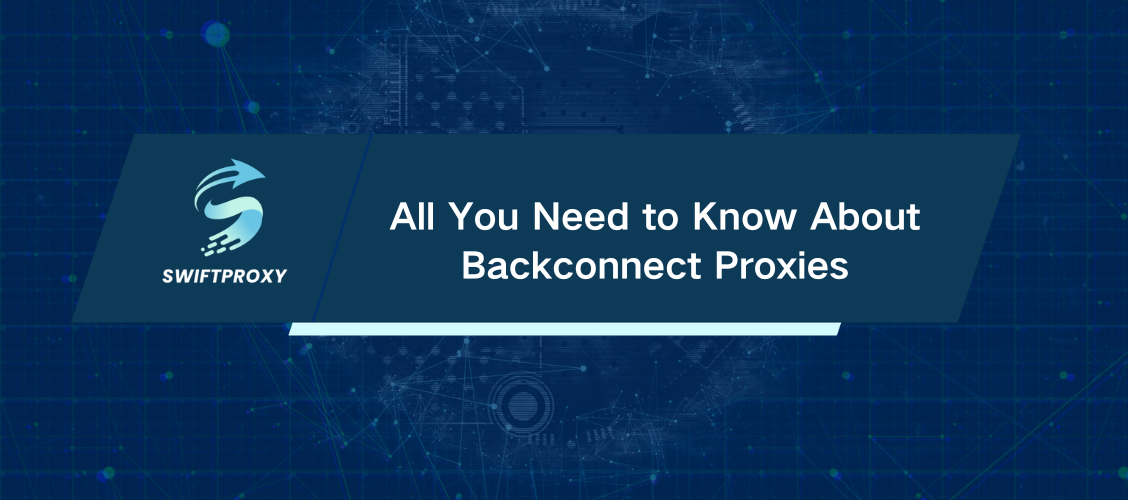All You Need to Know About Backconnect Proxies

Web scraping enables the gathering of public information from websites for tasks such as price comparison, market research, and ad verification. However, extracting large amounts of data can encounter potential blockades These can include IP blocking, where requests from specific IP addresses are restricted due to geographical or IP type restrictions, and rate limiting, which occurs when an IP address is blocked after making numerous requests within a short period.
This article outlines how to effectively overcome these obstacles using reverse proxies.
What are backconnect proxies?
A backconnect proxy server comprises a collection of standard proxies that rotate automatically with each request. This rotation ensures that a different IP address is presented to the website for collecting the desired public information. This process routes your IP address through multiple proxies, making it difficult for the target website to detect your web scraping activity.
How do backconnect proxies function?
In simple terms, a backconnect proxy functions by alleviating many of the challenges encountered during web browsing. This is achieved through the following process:
1. You send a request using a masked IP address.
2. The request passes through one proxy from the proxy pool.
3. The request reaches the target website.
4. The website provides the requested public information, which is returned to you through the same proxy.
5. You then make another request.
6. This new request is sent through a different proxy from the pool.
7. Once again, the request successfully reaches the website. The website provides the requested public information once more.
This process is repeated each time a request is made to the target website. Backconnect proxies enable the execution of millions of successful requests on a daily basis.
Advantages and disadvantages of backconnect proxies
To gain a complete understanding of a backconnect proxy, it's important to consider both its advantages and disadvantages.
Advantages
Time Efficiency
This is likely the primary reason why backconnect proxies are highly favored for web scraping. In a backconnect proxy network, proxies are rotated and allocated to various requests. The ability to handle multiple requests per minute significantly enhances efficiency and saves time. Moreover, automatic proxy rotation eliminates the need for manual upkeep.
Request Flexibility
Backconnect proxies are employed for web scraping to circumvent rate limits imposed by websites. These limits restrict the frequency of requests that can be sent to a target website, and exceeding them can lead to the proxy being banned. Backconnect proxies address this question by rotating your IP address through different proxies for each request made, ensuring continuous access to the desired information without encountering bans.
Anonymity
Maintaining a high level of anonymity is key to successful web scraping. Many websites are designed to block unmasked IP addresses, making anonymity essential to avoid being banned. Backconnect proxies can achieve anonymity while maintaining the full functionality of your scraping software.
IP Security
Security is a major concern in web scraping due to the potential risk of encountering malicious content. If your IP address is successfully targeted and compromised, it can lead to significant disruptions or even the termination of your web scraping activities. The backconnect proxy acts as a protective barrier between you and the website server, ensuring that potentially harmful information does not reach your system. This serves to safeguard both you and your IP address from malicious activities.
Disadvantages
Cost
Backconnect proxies provide enhanced security and anonymity, unrestricted multiple requests, and faster data extraction. These advantages typically come at a higher cost compared to other proxy types. However, if you're seeking a dependable and effective solution for web scraping, residential proxies are often considered one of the best options available.
Speed Issues
If you notice delays in the proxy delivering requests or returning information to your server, it can impact your productivity. This issue typically arises when using a backconnect proxy network that is distant from your scraping server or target server. For example, if your scraping server is in Canada, the backconnect proxy server is in Australia, and your target server is in Brazil, your request travels from Canada to Australia, then to Brazil, back to Australia, and finally to your scraping server in Canada. Given this lengthy and complex process, delays in speed are not unexpected. To resolve this, select a backconnect proxy server that is as close as possible to either your location or your target server's location.
Final Summary
Web scraping is valuable for numerous reasons and can yield substantial success and profitability when executed correctly. Enhancing your web scraping strategy with a backconnect proxy eliminates concerns such as IP blocks, rate limits, and other hindrances. Selecting a dependable proxy service provider is crucial as it ensures you can fully leverage proxies without encountering any issues.

















































